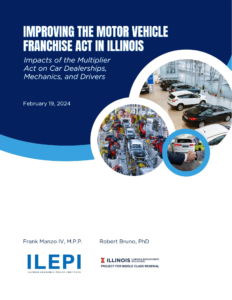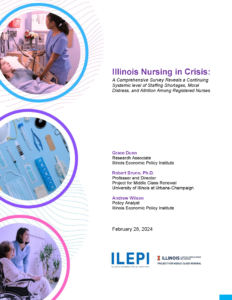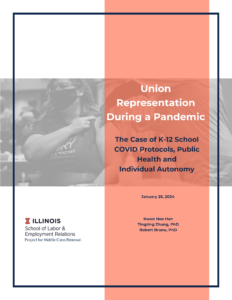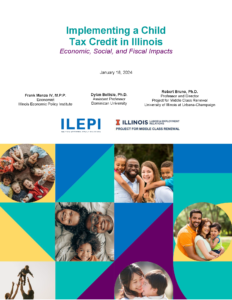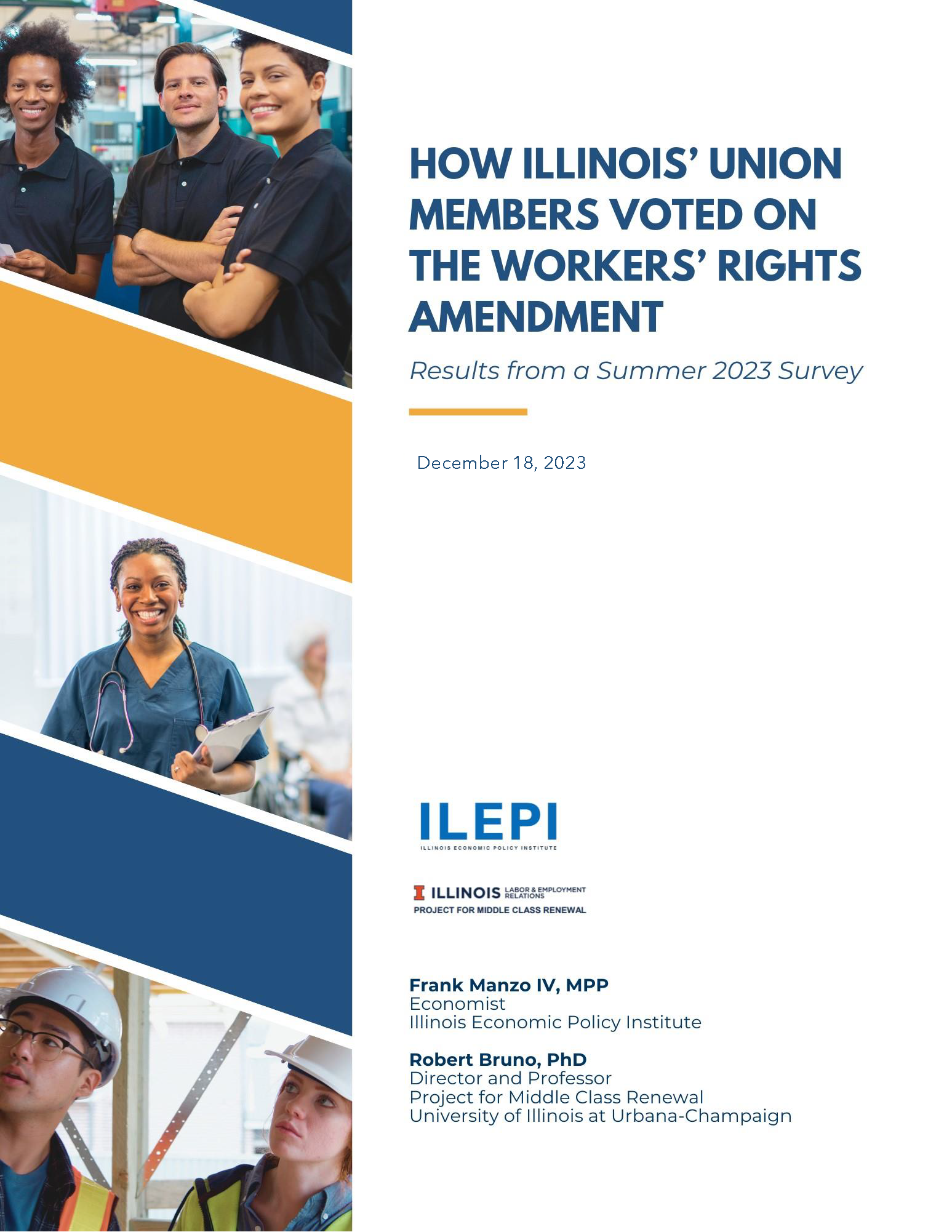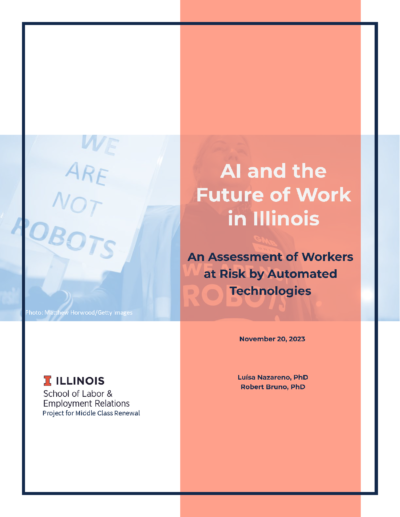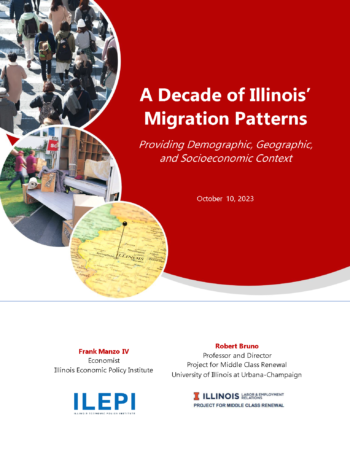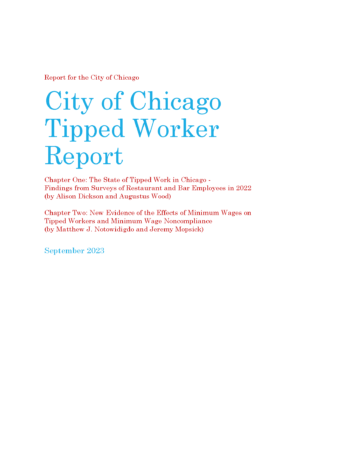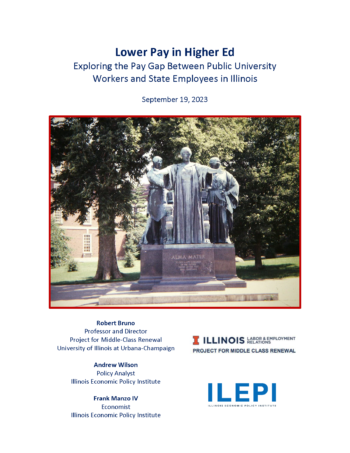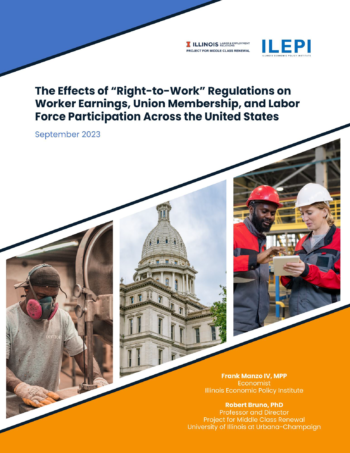
Policy Reports
Faculty conducts applied research to analyze workplaces, industries, worker organizations and employment conditions for private sector clients and in partnership with community organizations.
Utilizing a variety of research techniques including data collection and analysis, survey methods, and oral interviews, LEP contributes to both practical and scholarly understanding of issues facing workers and regional economic trends.
IMPROVING THE MOTOR VEHICLE FRANCHISE ACT IN ILLINOIS | Impacts of the Multiplier Act on Car Dealerships, Mechanics, and Drivers
In July 2021, Governor JB Pritzker signed House Bill 3940, amending the Motor Vehicle Franchise Act to ensure that auto mechanics at Illinois’ car dealerships earn equal pay for equal work.
The bipartisan law, which is also referred to as the Multiplier Act, passed 85-24 in the House and 58-0 in the Senate. It removed a two-tiered compensation system in which certified technicians earned below-market rates for auto repair work that is covered under warranty. Prior to the law’s passage, the difference between warranty rates and customer-paid retail rates negatively impacted the earnings potential of skilled auto mechanics in Illinois, contributing to high turnover and a shortage of qualified technicians at car dealerships. The Multiplier Act aimed to combat this labor shortage by requiring automakers to fully fund warranty repair services at dealerships. It went into effect on January 1, 2022.
Read full report here.
ILLINOIS NURSING IN CRISIS | A Comprehensive Survey Reveals a Continuing Systemic level of Staffing Shortages, Moral Distress, and Attrition Among Registered Nurses
For over two years, the COVID-19 pandemic stressed nurses and tested their skills and stamina. Preexisting nursing shortages deepened, leading to heightened workloads and severe burnout among nurses. Now, in the aftermath of COVID, a new survey reveals a continuing crisis of nurses’ mental and physical well-being, patient care quality, and the overall public health infrastructure of Illinois. Results from a survey of 385 registered nurses conducted in early October of 2022 to February of 2023, reinforce findings from prior surveys highlighting a distressing situation in Illinois’ healthcare system.
Read full report here.
UNION REPRESENTATION DURING A PANDEMIC | The Case of K-12 School COVID Protocols, Public Health and Individual Autonomy
The COVID-19 pandemic has had a profound effect on the Illinois educational workforce, creating a complex interplay between public health measures, individual autonomy, and union dynamics. This report, based on a survey of Illinois Federation of Teachers (IFT) members, highlights these multifaceted responses to vaccine mandates and the intricate position of teachers’ unions during these unprecedented times.
Read full report here.
IMPLEMENTING A STATE CHILD TAX CREDIT IN ILLINOIS | Economic, Social, and Fiscal Impacts
A Child Tax Credit is a credit for each child or dependent that households can claim on tax returns. The federal Child Tax Credit covers children under 17 years old and was temporarily expanded in 2021 under the American Rescue Plan Act. The expanded Child Tax Credit increased the amount of the credit, included 17-year-olds, introduced monthly payments to eligible households, and was made refundable, significantly increasing tax refunds for low- and middle-income families. With the expanded federal credit expiring but polls showing broad public approval of the policy, at least 14 states—including Illinois—have considered implementing their own Child Tax Credits. Currently, 15 states have enacted Child Tax Credits.
Read full report here.
HOW ILLINOIS’ UNION MEMBERS VOTED ON THE WORKERS’ RIGHTS AMENDMENT | Results from a Summer 2023 Survey
In November 2022, Illinois voters approved the Workers’ Rights Amendment, guaranteeing the fundamental right of workers to unionize and bargain collectively. The Amendment passed with 2.2 million votes, receiving 59 percent approval on the question and 53 percent yes votes among all ballots cast.
In the summer of 2023, the Project for Middle Class Renewal at the University of Illinois at Urbana-Champaign conducted an online survey of 970 rank-and-file union members in Illinois who voted in the 2022 midterm election to assess how they voted on the Workers’ Rights Amendment. The margin of error was ±3.1 percent.
Read full report here.
AI AND THE FUTURE OF WORK IN ILLINOIS | An Assessment of Workers at Risk by Automated Technologies
The rapid development of artificial intelligence (AI) and other automating technologies generates concerns among scholars, policymakers, and workers’ representatives. AI is expected to bring profound transformations to the workplace, and preparing for these changes will facilitate a smoother transition into the future.
In 2022, the Illinois Task Force on the Future of Work produced a comprehensive report highlighting areas for attention regarding how new technologies will impact the workforce, acknowledging potential impacts on wages, occupational trends, and the nature of work itself.
Read full report here.
A DECADE OF ILLINOIS’ MIGRATION PATTERNS | Providing Demographic, Geographic, and Socioeconomic Context
Reports of Illinois’ population decline have been greatly exaggerated due to a reliance on faulty Census estimates instead of actual counts of people. An analysis of Current Population Survey Annual Social and Economic Supplement survey data from 2013 through 2022 and Illinois Department of Revenue data from 2010 through 2020 can provide clarity and context, as well as important details on who is moving out of, moving into, and staying in Illinois. Read full report here.
City of Chicago Tipped Worker Report
This report consists of two chapters addressing potential reforms for tipped minimum wage in the City of Chicago. The Chicago Department of Business Affairs and Consumer Protection sought the assistance of the University of Illinois and the University of Chicago in conducting a study required by the Chicago City Council that examines the economic impact of tipped wages and the effectiveness of current enforcement in Chicago.
The first chapter, by Alison Dickson and Augustus Wood, analyzes collected survey responses of tipped restaurant and bar employees working in Chicago in an effort to identify employment violations and financial hardships experienced by workers. The second chapter, by Matthew Notowidigdo and Jeremy Mopsick, focuses on recent minimum wage reforms from cities across the country with special attention on tipped workers and minimum wage noncompliance in order to draw lessons for potential minimum wage reform in Chicago.
Read full report here.
STUDY | Workers at Illinois’ Public Universities Earn Significantly Less than Peers in State Government
Workers at Illinois’ public universities are earning between 14% and 20% less than their counterparts employed directly by state government agencies, according to a first-of-its-kind study released by the Project for Middle Class Renewal (PMCR) at the University of Illinois at Urbana-Champaign and the Illinois Economic Policy Institute (ILEPI).
Read full report here.
THE EFFECTS OF “RIGHT-TO-WORK” REGULATIONS ON WORKER EARNINGS, UNION MEMBERSHIP, AND LABOR FORCE PARTICIPATION ACROSS THE UNITED STATES
So-called “right-to-work” laws are government regulations that prohibit employers and unions from voluntarily ensuring that each member who accrues a return from collective bargaining also contributes a fair share. They allow workers to forgo union membership but require unions to continue providing services and benefits to those who do not pay. This reduces the resources that unions have available to advocate for workers and organize new members, weakening worker bargaining power. Read full report here.
